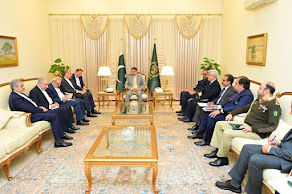Pakistan, Iran stress on tackling terrorism through coordination, intelligence sharing
A Cautious Thaw: Iranian Foreign Minister Meets PM Kakar as Pakistan, Iran Reiterate Anti-Terrorism Pledge
In a sign of cautious rapprochement, Iranian Foreign Minister Javad Zarif arrived in Islamabad today for a brief, yet significant, meeting with Prime Minister Kakar. Coming on the heels of a joint statement emphasizing collaboration on regional security, the encounter served as a tangible step towards de-escalating tensions and forging a more cooperative future.
The talks, described as "productive and forward-looking" by both sides, focused primarily on the shared challenge of terrorism. Both leaders acknowledged the devastating impact of extremist groups on their respective nations and underscored the need for unwavering commitment to their eradication. Notably, the statement highlighted enhanced intelligence sharing and closer coordination between security agencies as key pillars in this joint combat.
"We have endured the scourge of terrorism firsthand," remarked Prime Minister Kakar, citing the recent Balochistan bombing as a stark reminder of the ongoing threat. "Iran has also suffered immensely. It is time for our two nations to stand united against this common enemy."
Foreign Minister Zarif echoed this sentiment, stating, "Cooperation and collaboration are our sole options in this fight. Through shared intelligence and coordinated efforts, we can dismantle these networks and create a safer future for our people."
The meeting's emphasis on counter-terrorism resonates with broader regional anxieties. The rise of ISIS affiliates in Afghanistan and the persistent threat of sectarian violence in both Pakistan and Iran necessitate a unified approach. While skepticism towards the feasibility of genuine collaboration lingers, the leaders' commitment to joint action, if translated into concrete measures, could offer a glimmer of hope for stability in the region.
However, challenges remain. Historical mistrust and unresolved border disputes, coupled with the complex geopolitical landscape involving the United States and other regional powers, continue to cast a shadow over the rapprochement. The success of this cautious diplomatic thaw will hinge on the ability of both nations to move beyond past grievances and translate words into tangible actions on the ground.
Beyond the immediate focus on security, the meeting also touched upon economic cooperation and cultural exchanges. Both leaders recognized the vast potential for shared prosperity and acknowledged the importance of fostering closer ties between the Iranian and Pakistani people.
While the path forward for Iran-Pakistan relations remains uncertain, today's meeting represents a cautious step in the right direction. The emphasis on combating the shared threat of terrorism and exploring avenues for economic and cultural collaboration offers a glimmer of hope for a more stable and prosperous future for both nations. However, to translate this cautious thaw into a true strategic partnership, both Pakistan and Iran must navigate the complex regional landscape and demonstrate a sustained commitment to overcoming old wounds and building a new foundation for trust and cooperation.


Comments
Post a Comment